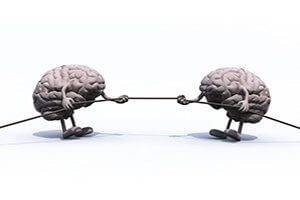Next time you are in a meeting, listen to how people rationalize why someone else is saying or doing something of which they don’t approve.
 “She’s doing that because she doesn’t want to change.”
“She’s doing that because she doesn’t want to change.”
“He’s saying that because he’s trying to justify more budget.”
“She’s asking that because she’s going to try and sell me something.”
These are just three examples we have heard during alignment work. The target of the judgment is rarely in the room when it is said. Those who are present find it logical and rationale. Some will agree, some will silently disagree, and the rest will take it as fact.
Different Drivers
When we ask people “Why do you think she is doing that?”, “Why do you think he is saying that?” it is a similar ‘negative judgment of the other person’s intent’ about 95% of the time.
This is called Different Drivers. i.e. One party is seen to have motivations and interests that the other party does not agree with.
Through several hundred cases of understanding the other party’s actual reason for their behavior, we have found that the assigned motivations were simply wrong in 95% of the cases.
The consequences of making, jumping to, believing these rational but mostly inaccurate negative judgments of the other person’s intent are dramatic.
When I experience being misaligned with someone and it’s due to their negative intent, why would I bother trying to solve it? Even if I could find a way to broach it with them, they would just deny it. And they’ll be offended, so I’ve just made the situation worse. It’s just much easier to accept the fact of what they are doing is wrong and work around or against it.
This is a key reason why that uncomfortable and unsettling feeling of ‘misalignment’ is a root cause to unnecessary politics and group dysfunction.
Different Data
About 35% of the time the cause was actually Different Data – where each party has different evidence, experiences, and observations, which lead them to think differently about some opinion or action.
“We are not very good at that”. I think we are, and she’s just saying we’re not because she’s trying to get more staff. Actually, it turns out that I have not seen various incidences and problems that she has, and when I stop trying to convince her why she’s wrong, I find out that I don’t have the full picture. When we combine our experiences and observations we both agree “We both believe this is not as good as it should be, and the gaps are x, y and z.”
Different Dictionary
However, the primary cause of non-likemindedness in groups (60%), that leads to misaligned actions, is Different Dictionary.
“We are not good at that.” Again, after I’ve shut up and listened to what causes her to say that, it turns out that we have the same data, but she has a different definition of ‘good’. (In practice, we have seen that it could be different definitions of ‘we’, ‘good’, and ‘this’.) When we learn that we have different dictionaries – that what I take for granted that I mean by a word or phrase is not the same as her meaning – we can converge on a common definition and shared judgment.
One Solution to Office Politics and Flawed Decision-making Reading this post, you just learnt that 95% of misalignment you experience is just you and others having different data and dictionaries driving your opinions. Doesn’t that feel better, just knowing that? I am not writing this to make you feel better, it’s not meant to be happy-talk. It’s just the data, from several years enabling hundreds of groups to get aligned around important subjects.
Reading this post, you just learnt that 95% of misalignment you experience is just you and others having different data and dictionaries driving your opinions. Doesn’t that feel better, just knowing that? I am not writing this to make you feel better, it’s not meant to be happy-talk. It’s just the data, from several years enabling hundreds of groups to get aligned around important subjects.
So, next time you find yourself making a negative judgment of someone else’s actions and words, realize that it might seem like a simple, logical, and solid inference, but that it’s only got about a 1 in 20 chance of being accurate.
Instead, just ask them, “You think that, I think this. What causes me to think this is a, b, and c. What is it that causes you to think that?” Listen and compare. Then come to an agreement on which of the three reasons for misalignment was in place, and use the insight to converge on what you both endorse.
Do not Agree to Disagree. That’s the weak, cheap, coward’s way out.